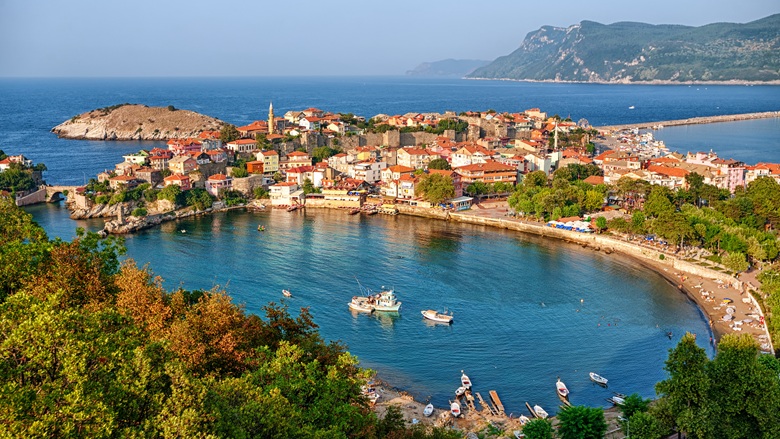The World Bank’s Blueing the Black Sea Program (BBSEA) aims to support the creation of a shared regional framework for sustainable management of the Black Sea. The program is implemented jointly with the governments of Bulgaria, Georgia, Moldova, Romania, Türkiye, and Ukraine. The BBSEA program cooperates with the Black Sea Commission (BSC) established under the Bucharest Convention, the Organization of the Black Sea Economic Cooperation (BSEC) and collaborates with the Common Maritime Agenda (CMA) for the Black Sea, and the European Commission (EC). The BBSEA Program is supported by the Global Environment Facility (GEF), PROBLUE, Quality Infrastructure Investment (QII), and the Jobs Umbrella Multi-Donor Trust Fund.
The BBSEA Program focuses on economics, marine pollution and ecosystem restoration, sustainable fisheries and aquaculture, blue jobs, regional cooperation, and capacity building. The program is comprised of investment projects, new research and knowledge development on pollution, climate change, and the economics of the Black Sea, and regional engagement and partnerships to bring solutions to scale. Through this multifaceted approach together with partners the World Bank supports the countries in developing the foundations for a sustainable Blue Economy in the region.
The Black Sea
The Blue Economy plays a crucial role in fostering sustainable growth across the Black Sea region. Countries rely on healthy coastal environment for fisheries and tourism industries. The health of the sea is the health of its inhabitants, starting from bacteria and its microscopic algae, all the way up to fish, dolphins and humans. According to the General Fisheries Commission for the Mediterranean, marine capture fisheries in the Black Sea region produce an estimated total revenue of $350 million annually and support more than 20,000 jobs excluding pre- and post-harvest labor. In the past 20 years, tourist arrivals in the Black Sea region grew faster than the world average.
Over the past two decades, however, the Black Sea has become one of the most polluted seas in Europe. An environmental survey funded by the European Union and the United Nations Development Program showed that the Black Sea has twice as much floating plastic as any other sea in Europe. Using various sampling techniques, the study identified 145 pollutants in water, fish and mollusks. To date, the economic loss from environmental degradation has not been properly estimated but can be significant, especially for coastal communities.
Pressures from rapid growth in agriculture, coastal urbanization, fisheries, and tourism have exacerbated water pollution in the Black Sea, including:
- Eutrophication caused by excessive nutrients deposited from agriculture activities, chemical pollution, invasive species, ineffective wastewater treatment, industrial hot spots, and atmosphere are among the chief threats to the marine environment in the Black Sea. Eutrophication leads to algal blooms, which can produce toxins harmful to marine life and humans. When these algae die and decompose, the oxygen consumption during decomposition results in hypoxic conditions that create "dead zones" where most marine life cannot survive.
- Plastics pollution causes huge damage to the environment, human health, and the economy. Beaches littered with plastic waste are less attractive to tourists. Plastic pollution can damage fishing gear and reduce fish populations. Greenhouse gas emissions all along the plastic lifecycle cost billions of dollars each year. Two thirds of plastic waste comes from single use plastics but less than 10% of all plastic waste is recycled. Interventions are needed at every stage of the plastic lifecycle to stop the leakages and increase circularity.
- Climate change makes the Black Sea increasingly vulnerable to higher temperatures and the risks of waterborne diseases as well as coastal flooding and sea level rise. This not only threatens coastal infrastructure and populations, but also the economic foundations and food security.
- Coastal water quality degradation leads to immediate loss of economic opportunities and diminishes wealth in the long run. Therefore, protecting the Black Sea is critical as it is an important share of each Black Sea country's natural capital.
Areas for capacity development include:
- Blue economy knowledge: At both the national and regional levels, there is a significant gap in understanding what the Blue Economy encompasses and how it can contribute to long-term development. This gap persists among policymakers, private sector actors, and the public. Without clear knowledge, it is difficult for stakeholders to implement strategic initiatives that foster sustainable practices or for the private sector to explore innovative solutions in ocean-based sectors.
- Blue economy diversification: Many countries in the Black Sea region are highly dependent on a few traditional sectors, such as tourism, fisheries, and extractive industries. This narrow focus limits their ability to adapt to economic fluctuations and environmental challenges. Diversification into sectors like renewable marine energy, sustainable aquaculture, marine biotechnology, and eco-tourism offers significant potential for sustainable growth. However, the absence of enabling policies and financial incentives hampers progress in these sectors.
- Private sector engagement: Despite growing interest, the private sector in many of these regions is not fully engaged in Blue Economy initiatives. Barriers include insufficient knowledge of market opportunities, regulatory uncertainties, and lack of access to finance. Furthermore, key industries like shipping, fisheries, and tourism, which could lead the transition to a sustainable Blue Economy, often operate in isolation from regional cooperation frameworks.
In 2019, recognizing these challenges, Bulgaria, Georgia, Moldova, Romania, Russia, Türkiye, and Ukraine endorsed the European Commission’s Common Maritime Agenda (CMA) for the Black Sea. The CMA includes a focus on the Blue Economy as a key element of the Black Sea and its coastal areas' sustainable economic development. CMA's main goals are: (1) healthy marine ecosystems; (2) a competitive, innovative, and sustainable economy for the Black Sea; and (3) fostering investment in the regional Blue Economy.

